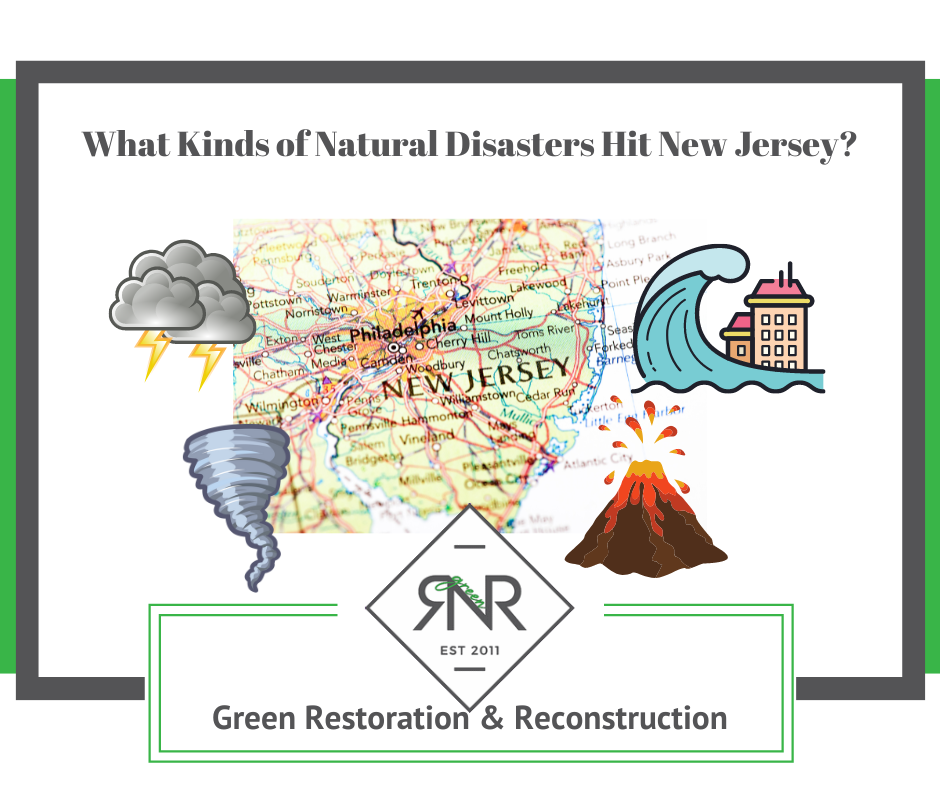Are you a homeowner in New Jersey? Have you ever wondered what kinds of disasters could strike your home and potentially upend your life as you know it? Whether it’s floods, hurricanes, fires or earthquakes, natural disasters can have devastating consequences. It is important to be informed on the types of calamities that may strike your area so that you are prepared if anything happens. Fortunately, Green Restoration & Reconstruction is here to break down the kinds of natural disasters hitting New Jersey—so read on to learn more!
Overview of Natural Disasters in New Jersey
New Jersey, often overlooked for its susceptibility to natural disasters, has a storied past of facing calamities such as earthquakes, hurricanes, floods, tornadoes, and even tsunamis. Nested along the Eastern seaboard of the United States, this coastal state is primed for weather-related events, including hurricanes and tropical storms bringing powerful winds and torrential rain. Its proximity to the Atlantic Ocean makes it vulnerable to storm surges, flooding, and tsunami threats. Moreover, New Jersey’s unique geological makeup raises concerns about its predisposition for earthquakes, ranging from minor tremors to intense quakes, although infrequent. As a stark reminder of the destructive power of these natural events, the state bears the scars of Hurricane Sandy, which wreaked havoc in 2012. As New Jersey continues to reinforce its infrastructure and develop better preparedness measures, understanding the diverse array of natural disasters affecting the area becomes increasingly vital in ensuring its communities' and residents' safety.
New Jersey is no stranger to the effects of natural disasters. In fact, its communities have seen a number of damaging events over the years, from floods and hurricanes to severe storms and even tornados. The state frequently experiences heavy rains and thunderstorms during hurricane seasons, bringing with them strong winds that can cause extensive damage.
New Jersey is considered a major hotspot for natural disasters due to its geographical location and high population density. From the great blizzard of 1888 that wreaked havoc on the state and shut down transportation for days, to hurricanes like Sandy in 2012, New Jersey has seen some of the worst effects of Mother Nature.
In addition to its geographical location, New Jersey is also prone to geological disasters such as earthquakes. The most recent large-scale seismic event to hit the state was on August 23rd, 2011, when a 5.8 magnitude earthquake shook the area.
New Jersey is also prone to flooding, which can be caused by hurricanes, heavy rains, and snowmelt. Flooding can lead to significant property damage and loss of life. Between 1960 and 2013, the state experienced 11 floods that caused losses of more than $1 billion.
Though rare, New Jersey is not immune to the destructive power of tornadoes – with severe summer thunderstorms capable of spawning these violent natural disasters.
In addition to the disasters mentioned above, New Jersey also experiences severe winter storms with significant snowfall. These storms can cause power outages and treacherous driving conditions, making it dangerous to navigate the roads. In 2010, a powerful nor'easter doused parts of the state with over two feet of snow and strong winds that brought about major destruction.
During the summer months, wildfires can be a serious issue due to the dry conditions that sometimes occur in the state.
New Jersey is also prone to tsunamis, although they are rare due to its location away from active seismic zones. In 1883, a tsunami caused by an underwater earthquake in Indonesia reached the Atlantic coastline of North America and caused minor damage to some homes in New Jersey. A much smaller tsunami hit as recently as 2013.
New Jersey, a densely populated state on the east coast of the United States, is no stranger to the wrath of natural disasters. With a varying climate and proximity to the Atlantic Ocean, the state faces an assortment of calamities, some of which are more common than others. Among these, hurricanes and tropical storms lead the pack, engulfing the region with torrential rainfall and destructive winds. For instance, in 2012, Hurricane Sandy, infamously known as "Superstorm Sandy," caused unparalleled damage all over the state. Another prevalent natural disaster in New Jersey is flooding, which often occurs as a result of overflowing rivers and creeks, as well as the rapid melting of snow. In addition to the aforementioned catastrophes, the state occasionally experiences blizzards and nor'easters during the winter months. These powerful storms can bring paralyzing snowfall and ice, causing hazardous road conditions and widespread power outages. By being aware of these common natural disasters, New Jersey residents can better safeguard themselves and respond effectively to these inevitable forces of nature.
How Homeowners can Prepare for and Mitigate Damage from Natural Disasters
Natural disasters can be catastrophic and unpredictable, but homeowners can take proactive steps to both prepare for and mitigate the damage caused by such disasters. It is essential to develop a well-thought-out emergency plan that includes the identification of potential hazards in and around the property, escape routes, and a course of action to protect both family members and possessions. Investing in disaster-resistant materials and techniques for home construction and renovation can significantly reduce the risk of damage. Regular maintenance and inspection of vital structures, such as roofs, drainage systems, and foundations, can help to identify and address potential vulnerabilities. Additionally, staying informed about disaster risks in their area and understanding local evacuation guidelines can aid homeowners in reacting quickly and sensibly in the event of an emergency. Finally, having suitable insurance coverage is crucial to ensure financial protection and support the recovery process after a natural disaster strikes. By taking these measures, homeowners can safeguard their homes, families, and investments against the devastating impact of natural disasters.
When to Call Green Restoration & Reconstruction for Insurance Disaster Repairs
Experiencing the aftermath of a disaster can be both overwhelming and intimidating for homeowners. In such times, knowing exactly when to call Green Restoration & Reconstruction for insurance disaster repairs is crucial in order to minimize the damage and restore your space efficiently. The moment you discover damages to your property due to a catastrophe like a flood, fire, storm, or any other unforeseen event, it's essential to act promptly by contacting a reliable and experienced restoration service. Green Restoration & Reconstruction specializes in helping clients with insurance claims and repairing the damage caused by a disaster. With their knowledgeable team, state-of-the-art equipment, and understanding of insurance policies, they are your go-to experts in facilitating a hassle-free restoration process while ensuring your property returns to its original condition or even better. Don't hesitate, and reach out to Green Restoration & Reconstruction as soon as disaster strikes for a timely, effective, and seamless recovery.
Benefits of Working with a Professional After a Natural Disaster
In the aftermath of a natural disaster, engaging the services of a professional can prove to be immensely beneficial in mitigating the adverse effects. These experts bring a wealth of experience and knowledge, enabling them to assess damages, execute safety measures, and help individuals and communities regain stability. These seasoned pros often possess specialized equipment capable of dealing with a wide range of hazards brought on by disasters such as floods, earthquakes, or hurricanes, and can implement effective solutions to prevent additional harm. Furthermore, professionals are adept at streamlining the recovery process and can provide invaluable guidance on navigating complex disaster relief procedures and insurance claims. By enlisting the assistance of a professional, you can find the much-needed support to recover and rebuild in the wake of a devastating natural disaster.
Concrete Steps to Take After a Natural Disaster in New Jersey
In the immediate aftermath of a natural disaster in New Jersey, it is crucial to remain informed, proactive and prepared in order to efficiently navigate the challenging road to recovery. First and foremost, prioritize the safety of you and your loved ones by tuning in to local news reports and following any evacuation orders, if necessary. Next, assess the damage to your property and take photos for documentation purposes, as this evidence will be essential when filing insurance claims. Additionally, contact your insurance company as soon as possible to report the incident and commence the claims process. As you begin the rebuilding process, it is important to research reputable contractors and obtain multiple estimates to ensure high-quality work at a fair price. Lastly, consider applying for assistance from the Federal Emergency Management Agency (FEMA) or other financial aid programs that may be available to you. By taking these concrete steps, you will be well on your way to regaining a sense of stability and normalcy after the devastating impact of a natural disaster.
New Jersey faces many natural disasters, and it's important to have a plan for what to do in the event of one. Having a reliable resource like Green Restoration & Reconstruction can make all the difference. We specialize in insurance disaster repairs, making it easy to recover quickly after a natural disaster. Our professional team can provide peace of mind that your home or business is being taken care of the right way. Don't wait until after something has happened; take concrete steps today to make sure you're prepared if a natural disaster happens. Ensure that you know what kinds of disasters strike your area and how you can mitigate any potential damage. Make sure that you're connected with a reputable business like Green Restoration & Reconstruction so they can be on call in case assistance is needed after a disaster strikes. Be proactive now so that should the worst happen, you'll be able to rely on professionals who have experience in restoring properties following natural disasters.


